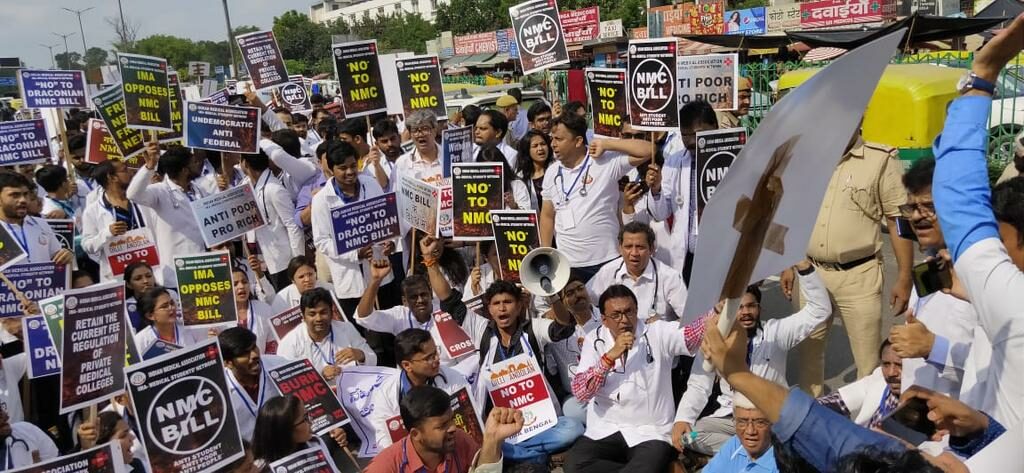Indian Medical Association (IMA) rejects NMC Bill 2019, strike called on Wednesday July 31

New Delhi, July 30, 2019 : The Indian Medical Association (IMA) is a national voluntary organisation of Doctors of Modern Scientific System of Medicine in India, which looks after the interest of doctors as well as the well being of the community at large, has rejected National Medical Commission Bill, 2019 , which was passed by the Lok Sabha on Monday. To protest against the Bill, the IMA has called for 24 hours withdrawal of services on Wednesday 31.07.2019. Emergency, Casualty, ICU and related services will function normally.
In a press release IMA stated, “The democratic Lower House dumped healthcare & medical education of this country into darkness by approving undemocratic National Medical Commission Bill 2019. Section 32 of the NMC Bill, instantly, provides for licensing of 3.5 lakhs unqualified non medical persons to practice modern medicine and provides to add more and more such persons every year. The term Community Health Provider has been vaguely defined to allow anyone connected with modern medicine practice to get registered in NMC and be licensed to practice modern medicine. This would mean that all paramedics including pharmacists, nurses, physiotherapists, optometrists and others are becoming eligible to practice modern medicine and prescribe independently. This law legalises quackery.”
It further added, “This provision and the earlier objected provisions can never be accepted by the medical fraternity of the country. The mess created by the Bill regarding the examinations affecting the career of generations of medical students can not be condoned. The numerous other inconsistencies in the Bill will seriously affect the Health of the nation. The emergency Action Committee reviewed the situation yesterday night. It has been decided to call for 24 hours withdrawal of non essential services across the nation by modern medicine doctors from 6 am on Wednesday, 31.07.2019 till 6 am next day i.e. Thursday, 01.08.2019.”
Also, public demonstrations and hunger strikes will be organised by all the state and local branches. All the members of the modern medical fraternity are requested to participate. All the medical students are requested to boycott classes and proclaim solidarity.
“The war against NMC will continue. The struggle to redeem the Health of the nation is our privilege and sacred duty. We will never allow licensing unqualified non medical persons to kill our patients. We will never allow our mothers and children die in thousands forever due to this Black Law. IMA baptised in the freedom struggle of the nation rises to protect our patients and the Health of the nation”, the press release further stated.
- The National Medical Commission Bill, 2019 was introduced by the Minister of Health and Family Welfare, Dr. Harsh Vardhan in Lok Sabha on July 22, 2019. The Bill seeks to repeal the Indian Medical Council Act, 1956 and provide for a medical education system which ensures: (i) availability of adequate and high quality medical professionals, (ii) adoption of the latest medical research by medical professionals, (iii) periodic assessment of medical institutions, and (iv) an effective grievance redressal mechanism. Key features of the Bill include:
- Constitution of the National Medical Commission: The Bill sets up the National Medical Commission (NMC). Within three years of the passage of the Bill, state governments will establish State Medical Councils at the state level. The NMC will consist of 25 members, appointed by the central government. A Search Committee will recommend names to the central government for the post of Chairperson, and the part time members. The Search Committee will consist of seven members including the Cabinet Secretary and five experts nominated by the central government (of which three will have experience in the medical field).
- Members of the NMC will include: (i) the Chairperson (must be a medical practitioner), (ii) Presidents of the Under-Graduate and Post-Graduate Medical Education Boards, (iii) the Director General of Health Services, Directorate General of Health Services, (iv) the Director General, Indian Council of Medical Research, and (v) five members (part-time) to be elected by the registered medical practitioners from amongst themselves from states and union territories for a period of two years.
- Functions of the National Medical Commission: Functions of the NMC include: (i) framing policies for regulating medical institutions and medical professionals, (ii) assessing the requirements of healthcare related human resources and infrastructure, (iii) ensuring compliance by the State Medical Councils of the regulations made under the Bill, (iv) framing guidelines for determination of fees for up to 50% of the seats in private medical institutions and deemed universities which are regulated under the Bill.
- Medical Advisory Council: Under the Bill, the central government will constitute a Medical Advisory Council. The Council will be the primary platform through which the states/union territories can put forth their views and concerns before the NMC. Further, the Council will advise the NMC on measures to determine and maintain minimum standards of medical education.
- Autonomous boards: The Bill sets up autonomous boards under the supervision of the NMC. Each autonomous board will consist of a President and four members, appointed by the central government. These boards are: (i) the Under-Graduate Medical Education Board (UGMEB) and the Post-Graduate Medical Education Board (PGMEB): These Boards will be responsible for formulating standards, curriculum, guidelines, and granting recognition to medical qualifications at the undergraduate and post graduate levels respectively. (ii) The Medical Assessment and Rating Board (MARB): MARB will have the power to levy monetary penalties on medical institutions which fail to maintain the minimum standards as laid down by the UGMEB and PGMEB. The MARB will also grant permission for establishing a new medical college, starting any postgraduate course, or increasing the number of seats. (iii) The Ethics and Medical Registration Board: This Board will maintain a National Register of all licensed medical practitioners, and regulate professional conduct. Only those included in the Register will be allowed to practice medicine. The Board will also maintain a separate National Register for community health providers.
- Community health providers: Under the Bill, the NMC may grant a limited license to certain mid-level practitioners connected with the modern medical profession to practice medicine. These mid-level practitioners may prescribe specified medicines in primary and preventive healthcare. In any other cases, these practitioners may only prescribe medicines under the supervision of a registered medical practitioner.
- Entrance examinations: There will be a uniform National Eligibility-cum-Entrance Test for admission to under-graduate and post-graduate super-speciality medical education in all medical institutions regulated under the Bill. The NMC will specify the manner of conducting common counselling for admission in all such medical institutions.
- The Bill proposes a common final year undergraduate examination called the National Exit Test for the students graduating from medical institutions to obtain the license for practice. This test will also serve as the basis for admission into post-graduate courses at medical institutions under this Bill.








